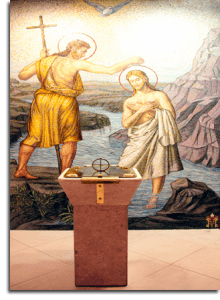 We welcome you to St. Juliana Church for the Baptism of your child. The baptism of an infant is an occasion for celebration and for welcoming a new member into our community. Adults who have never been baptized take part in the R.C.I.A., “The Rite of Christian Initiation for Adults.” They are baptized at the Easter Vigil.
We welcome you to St. Juliana Church for the Baptism of your child. The baptism of an infant is an occasion for celebration and for welcoming a new member into our community. Adults who have never been baptized take part in the R.C.I.A., “The Rite of Christian Initiation for Adults.” They are baptized at the Easter Vigil.
Holy baptism is the basis of the whole Christian life, the gateway to life in the Spirit, and the door which gives access to the other sacraments. Through Baptism we are freed from sin and reborn as children of God; we become members of Christ, are incorporated into the Church and made sharers in her mission: “Baptism is the sacrament of regeneration through water in the Word.”
Baptism is a sacrament of faith. But faith needs the community of believers. It is only within the faith of the Church that each of the faithful can believe. The faith required for Baptism is not a perfect and mature faith, but a beginning that is called to develop. The catechumen or the godparent is asked: “What do you ask of God’s Church?” the response is: “Faith!”
For all the baptized, children or adults, faith must grow after Baptism. For this reason the Church celebrates each year at the Easter Vigil the renewal of baptismal promises. Preparation for Baptism leads only to the threshold of new life. Baptism is the source of that new life in Christ from which the entire Christian life springs forth.
This day will be the beginning of life in Christ and life in the Church for your child. We hope as well that it will be an opportunity for recommitment to your faith for yourselves. Please keep the following information in mind in preparation for your child’s baptism:
We ask that only the parents make the baptismal arrangements.
Baptism of a child makes sense when one or both parents practice the Catholic faith regularly (by going to Mass on Sundays, praying, living in accord with the commandments). The preparation classes we offer have as their purpose to encourage you to reflect on your faith in Christ and the commitment to it that is implicit in your decision to have your child baptized. Classes in English are on the last Saturday of the month, from 9:30 to 11:30 a.m., in the School Conference Room. (Note: Spanish classes are on the the same Saturday in the Cafeteria). Parents are obliged to attend the class. Godparents should also attend.
Children may be baptized without first having received catechism through the 1st grade. After that, they should enter Faith Formation to prepare them for Baptism and First Communion.
Parents who are not married or are not married in the Catholic Church are strongly encouraged to talk to a priest as soon as possible. Since your marital status affects your ability to practice your faith and receive the sacraments, it will also affect your ability to give a good example of Catholic life to your child.
Godparents must be Catholics who have been baptized and confirmed and they should be at least 16 years old. They should be practicing Catholics, going to Mass on Sundays and receiving Communion regularly. If married, they must be married in the Catholic Church. For godparents who are not members of St. Juliana’s, we need a “Sponsor Certificate” from their parish indicating that they are qualified to serve as godparents.
At a minimum, there must be one godparent. There are normally two godparents, one man, and one woman. There may not be more than two godparents, and only one man and one woman. One non-Catholic Christian (not Adventists, Mormons, Jehovah’s Witnesses) may be admitted as a witness to Baptism if there is only one godparent. This witness must be the opposite gender as the godparent. An Orthodox Christian may be a godparent as long as the other godparent is Catholic. In order to make sure that we have the correct information about the child in our records, we ask for a birth certificate.
If one parent is unable to attend either the class or the baptism, we ask for a letter from him/her authorizing the baptism of the child.
Baptisms take place the first Saturday of the month in English and the second and third Saturday in Spanish. Arrangements must be made one month in advance.
Should you have any questions, please feel free to call the office at 561-833-9745.
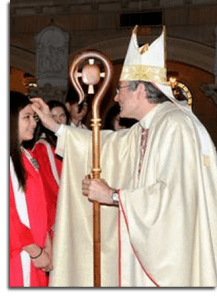 Baptism, the Eucharist, and the sacrament of Confirmation together constitute the “sacraments of Christian initiation,” whose unity must be safeguarded. The reception of the sacrament of Confirmation is necessary for the completion of baptismal grace. For “by the sacrament of Confirmation, the baptized are more perfectly bound to the Church and are enriched with a special strength of the Holy Spirit.” Hence they are, as true witnesses of Christ, more strictly obliged to spread and defend the faith by word and deed.
Baptism, the Eucharist, and the sacrament of Confirmation together constitute the “sacraments of Christian initiation,” whose unity must be safeguarded. The reception of the sacrament of Confirmation is necessary for the completion of baptismal grace. For “by the sacrament of Confirmation, the baptized are more perfectly bound to the Church and are enriched with a special strength of the Holy Spirit.” Hence they are, as true witnesses of Christ, more strictly obliged to spread and defend the faith by word and deed.
Confirmation is the full outpouring of the Holy Spirit as once granted to the apostles on the day of Pentecost. From this fact, Confirmation brings an increase and deepening of baptismal grace:
- Confirmation roots us more deeply in the divine filiation which makes us cry, “Abba!, Father!”;
- and unites us more firmly to Christ;
- and increases the gifts of the Holy Spirit in us;
- and renders our bond with the Church more perfect;
- and gives us a special strength of the Holy Spirit to spread and defend the faith by word and action as true witnesses of Christ, to confess the name of Christ boldly, and never to be ashamed of the Cross.
The ninth grade is the normal time for the celebration of the Sacrament of Confirmation. There is an intensive two-year preparation period which is in addition to the normal religious instruction for teens in this age group.
We remind you that we have a two-year preparation process for Confirmation. Candidates are required to either participate in both Confirmation 1 and 2 or attend 8th grade in a Catholic School and then participate in Confirmation 2. For more information, please call the Faith Formation Office at 833-1278.
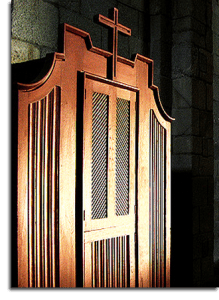 This sacrament is rooted in the mission God gave to Christ in his capacity as the Son of Man on earth to go and forgive sins. After his resurrection, Jesus passed on his mission to forgive sins to his Apostles, telling them in John 20:21-23:
This sacrament is rooted in the mission God gave to Christ in his capacity as the Son of Man on earth to go and forgive sins. After his resurrection, Jesus passed on his mission to forgive sins to his Apostles, telling them in John 20:21-23:
“[Jesus] said to them again,“Peace be with you. As the Father has sent me, so I send you.” And when he had said this, he breathed on them and said to them, “Receive the holy Spirit. Whose sins you forgive are forgiven them, and whose sins you retain are retained.”
Those who approach the sacrament of Reconciliation obtain pardon from God’s mercy for the offense committed against Him, and are, at the same time, reconciled with the Church which they have wounded by their sins and which by charity, by example, and by prayer labors for their conversion.
How To Go To Confession
-
- The priest greets you.
- You say: “Forgive me, Father, for I have sinned.” You then say how long it has been since your last Confession.
- You tell the priest your sins and answer any questions.
- The priest will give you some advice and will assign you a penance.
- You will next pray the Act of Contrition (see below).
- The priest then gives absolution.
- The priest will then say: “Give thanks to the Lord, for He is good.”
- You respond: “His mercy endures forever.” The priest will then dismiss you.
Act of Contrition
Praying the Act of Contrition is an essential part of the Sacrament of Reconciliation. The prayer expresses one’s heartfelt sorrow for sin, and states the commitment, with the help of God’s grace, to live a better life. Each Catholic should know an Act of Contrition by memory. Three are listed below:
-
-
- O my God, I am heartily sorry for having offended Thee, and I detest all my sins because I dread the loss of heaven and the pains of hell. But most of all, because they offend Thee, my God, Who art all good and deserving of all my love. I firmly resolve, with the help of Thy grace, to confess my sins, to do penance, and to amend my life. Amen
- My God, I am heartily sorry for having offended you. I detest all my sins because of your just punishment, but most of all because they offend you, my God, who are all good and deserving of all my love. I firmly resolve, with the help of your grace, to sin no more, and to avoid the near occasion of sin. Amen
- My God, I am sorry for my sins with all my heart. In choosing to do wrong and failing to do good, I have sinned against you whom I should love above all things. I firmly intend, with your help, to do penance, to sin no more, and to avoid whatever leads me to sin. Our Savior Jesus Christ suffered and died for us. In his name, my God, have mercy. Amen.
-
Reconciliation Schedule
The opportunities for reconciliation (confession) are:
Saturday 3:15 p.m. – 4:15 p.m.
*Confessions will be by appointment only Monday – Friday until further notice. Please contact the parish office at (561) 833-9745 to schedule it.
*Las Confesiones serán por cita solamente de Lunes a Viernes hasta nuevo aviso. Por favor llame a la oficina parroquial al (561) 833-9745 para programar su cita.
Read God’s Gift of Forgiveness: A Pastoral Exhortation on the Sacrament of Penance and Reconciliation.
Click here to read the full article!
In John 6, Jesus said “I am the living bread that came down from heaven; whoever eats this bread will live forever; and the bread that I will give is my flesh for the life of the world.”
The Jews quarreled among themselves, saying, “How can this man give us [his] flesh to eat?” Jesus said to them, “Amen, amen, I say to you, unless you eat the flesh of the Son of Man and drink his blood, you do not have life within you. Whoever eats my flesh and drinks my blood has eternal life, and I will raise him on the last day. For my flesh is true food, and my blood is true drink. Whoever eats my flesh and drinks my blood remains in me and I in him.”
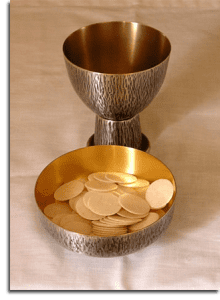 At the Last Supper, on the night he was betrayed, our Savior instituted the Eucharistic sacrifice of his Body and Blood. This he did in order to perpetuate the sacrifice of the cross throughout the ages until he comes again, and so to entrust to his beloved Spouse, the Church, a memorial of his death and resurrection.
At the Last Supper, on the night he was betrayed, our Savior instituted the Eucharistic sacrifice of his Body and Blood. This he did in order to perpetuate the sacrifice of the cross throughout the ages until he comes again, and so to entrust to his beloved Spouse, the Church, a memorial of his death and resurrection.
The Eucharist is the heart and the summit of the Church’s life, for in it Christ associates his Church and all her members with his sacrifice of praise and thanksgiving offered once for all on the cross to his Father; by this sacrifice he pours out the graces of salvation on his Body which is the Church.
The Eucharistic celebration always includes the proclamation of the Word of God; thanksgiving to God the Father for all his benefits, above all the gift of his Son; the consecration of bread and wine; and participation in the liturgical banquet by receiving the Lord’s body and blood. These elements constitute one single act of worship.
The Eucharist is the memorial of Christ’s Passover, that is, of the work of salvation accomplished by the life, death, and resurrection of Christ, a work made present by the liturgical action.
It is Christ himself, the eternal high priest of the New covenant who, acting through the ministry of the priests, offers the Eucharistic sacrifice. And it is the same Christ, really present under the species of bread and wine, who is the offering of the Eucharistic sacrifice.
Only validly ordained priests can preside at the Eucharist and consecrate the bread and the wine so that they become the Body and Blood of the Lord. The essential signs of the Eucharistic sacrament are wheat bread and grape wine, on which the blessing of the Holy Spirit is invoked and the priest pronounces the words of consecration spoken by Jesus during the last Supper: “This is my body which will be given up for you… This is the cup of my blood…” By the consecration the transubstantiation of the bread and wine into the Body and Blood of Christ is brought about. Under the consecrated species of bread and wine Christ himself, living and glorious, is present in a true, real, and substantial manner: his body and his Blood, with his soul and his divinity.
As sacrifice, the Eucharist is also offered in reparation for the sins of the living and the dead and to obtain spiritual or temporal benefits from God.
Anyone who desires to receive Christ in Eucharistic communion must be in the state of grace. Anyone aware of having sinned mortally must not receive communion without first having received absolution in the sacrament of penance.
The Church warmly recommends that the faithful receive Holy communion each time they participate in the celebration of the Eucharist; she obliges them to do so at least once a year.
Because Christ himself is present in the sacrament of the altar, he is to be honored with the worship of adoration. “To visit the Blessed Sacrament is… a proof of gratitude, an expression of love, and a duty of adoration toward Christ our Lord”.
Having passed from this world to the Father, Christ gives us in the Eucharist the pledge of glory with him. Participation in the Holy Sacrifice identifies us with his Heart, sustains our strength along the pilgrimage of this life, makes us long for eternal life, and unites us even now to the Church in heaven, the blessed Virgin Mary, and all the saints.
“Is any among you sick? Let him call for the presbyters of the Church, and let them pray over him, anointing him with oil in the name of the Lord; and the prayer of faith will save the sick man, and the Lord will raise him up; and if he has committed sins, he will be forgiven” (James 5:14-15). The sacrament of Anointing of the Sick has as its purpose the conferral of a special grace on the Christian experiencing the difficulties inherent in the condition of grave illness or old age.
The proper time for receiving this holy anointing has certainly arrived when the believer begins to be in danger of death because of illness or old age. Each time a Christian falls seriously ill, they may receive the Anointing of the Sick, and also when, after they have received it, the illness worsens.
The celebration of the Anointing of the Sick consists essentially in the anointing of the forehead and hands of the sick person (in the Roman Rite) or of other parts of the body (in the Eastern rite), the anointing being accompanied by the liturgical prayer of the celebrant asking for the special grace of this sacrament.
The special grace of the sacrament of the Anointing of the Sick has as its effects: the uniting of the sick person to the passion of Christ, for his own good and that of the whole Church; the strengthening, peace, and courage to endure in a Christian manner the sufferings of illness or old age; the forgiveness of sins, if the sick person was not able to obtain it through the sacrament of Reconciliation; the restoration of health, if it is conducive to the salvation of their soul; and the preparation of passing over to eternal life.
Pastoral Care of the Sick
Individuals who are sick are very important to our parish community. Holy Communion may be brought by a priest or Eucharistic Minister to those people who are confined to home. All who are seriously ill are encouraged to request the Sacrament of the Anointing of the Sick. Arrangements for Communion at home and the Anointing are made on an individual basis by calling the rectory.
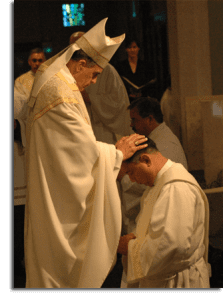
The whole Church is a priestly people. Through baptism all the faithful share in the priesthood of Christ. This participation is called the “common priesthood of the faithful.” Based on this common priesthood and ordered to its service, there exists another participation in the mission of Christ: the ministry conferred by the sacrament of Holy Orders, where the task is to serve in the name and in the person of Christ the Head in the midst of the community. The ministerial priesthood differs in essence from the common priesthood of the faithful because it confers a sacred power for the service of the faithful. The ordained ministers exercise their service for the People of God by teaching, divine worship, and pastoral governance.
The bishop receives the fullness of the sacrament of Holy Orders, which integrates him into the episcopal college and makes him the visible head of the particular Church entrusted to him. As successors of the apostles and members of the college, the bishops share in the apostolic responsibility and mission of the whole Church under the authority of the Pope, successor of St. Peter.
Priests are united with the bishops in sacerdotal dignity and at the same time depend on them in the exercise of their pastoral functions; they are called to be the bishops’ prudent co-workers. They form around their bishop the presbyterium which bears responsibility with him for the particular Church. They receive from the bishop the charge of a parish community or a determinate ecclesial office.
Permanent Deacons are ministers ordained for tasks of service of the Church; they do not receive the ministerial priesthood, but ordination confers on them important functions in the ministry of the Word, divine worship, pastoral governance, and the service of charity, tasks which they must carry out under the pastoral authority of their bishop.
The sacrament of Holy Orders is conferred by the laying on of hands followed by a solemn prayer of consecration asking God to grant the ordinance the graces of the Holy Spirit required for his ministry. Ordination imprints an indelible sacramental character.
The Church confers the sacrament of Holy Orders only on baptized men, whose suitability for the exercise of the ministry has been duly recognized. Church authority alone has the responsibility and right to call someone to receive the sacrament of Holy Orders.
In the Latin Church the sacrament of Holy Orders for the presbyterate is normally conferred only on candidates who are ready to embrace celibacy freely and who publicly manifest their intention of staying celibate for the love of God’s kingdom and the service of men.
If you feel called to become a priest or deacon, speak to one of our priests.
The marriage covenant, by which a man and a woman form with each other an intimate communion of life and love, has been founded and endowed with its own special laws by the Creator. By its very nature it is ordered to the good of the couple, as well as to the generation and education of children. Christ the Lord raised marriage between the baptized to the dignity of a sacrament.
The sacrament of Matrimony signifies the union of Christ and the Church. It gives spouses the grace to love each other with the love with which Christ has loved the Church; the grace of the sacrament thus perfects the human love of the spouses, strengthens their indissoluble unity, and sanctifies them on the way to eternal life.
Marriage is based on the consent of the contracting parties, that is, on their will to give themselves, each to the other, mutually and definitively, in order to live a covenant of faithful and fruitful love.
Since marriage establishes the couple in a public state of life in the Church, it is fitting that its celebration be public, in the framework of a liturgical celebration, before the priest (or a witness authorized the by Church), the witnesses, and the assembly of the faithful.
We encourage those planning a marriage to make arrangements with a priest at least 6 months prior to the anticipated date so that proper preparations (including Pre-Cana) can be made. Please call the rectory for more information.
Click here to download a copy of the Marriage Preparation Guidelines for St. Juliana Parish. Please call the office with any questions 561-833-9745.
For more information on getting married in the Catholic Church, see:



